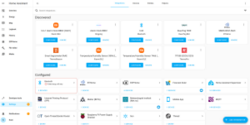Home Assistant 2023.11 Release and a Review
-
2023.11 To-do: Add release title
Home Assistant 2023.11! 🎃
It seems like I forgot to come up with a release title for this release and left a placeholder in the title. If I only could have it on a to-do list somewhere… 🤔
Before we dive into this pretty massive release, I want to quickly look back at two amazing things that happened in the past month.
First, we presented chapter 4 of the Year of the Voice, which introduced the new wake word feature in Home Assistant. This really brings the voice assistant experience to the next level, and we are super excited about it! Like have you seen the R5-based voice assistant droid? 😍
-
Home Assistant 2023.11 released
Home Assistant 2023.11 is available. New features include a to-do list manager, Matter 1.2 support, customizable tile cards, new integrations, and more.
-
Home Assistant: ten years of privacy-focused home automation
Many home-automation devices come with their own mobile app or cloud service. However, using multiple apps or services is inconvenient, so it's (purposely) tempting to only buy devices from the same vendor, but this can lead to lock-in. One project that lets users manage home-automation devices from various vendors without lock-in is Home Assistant. Over its ten-year existence, it has developed into a user-friendly home-automation platform that caters to both technically inclined and less tech-savvy people.
In 2012, while finishing his master's thesis, Paulus Schoutsen purchased a Philips Hue starter kit consisting of a hub and three light bulbs. When he discovered that the hub had a local API accessible over the network, he wrote a Python script to control the light bulbs. Then he wrote a script that would turn on the lights at sunset, but soon he realized that the bulbs would turn on when no one was home. To address this, he developed a script that logged into his WiFi access point to detect connected phones and used this presence-detection as a condition in his light-automation script.
Recognizing its potential usefulness for others, Schoutsen refactored the code and made it configurable so that users would not have to write Python code themselves. On September 17, 2013, he released the first version of his Home Assistant project to GitHub. He started promoting it on the r/homeautomation subreddit whenever people sought advice on automating their homes; the project gained momentum as the community expanded and more developers contributed.

